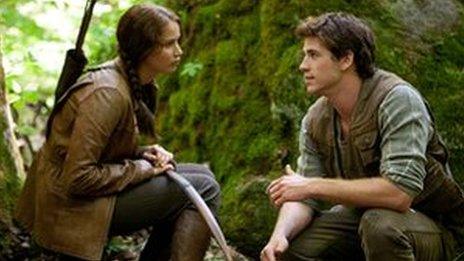Hunger Games: Fact and fiction collide
- Published
- comments
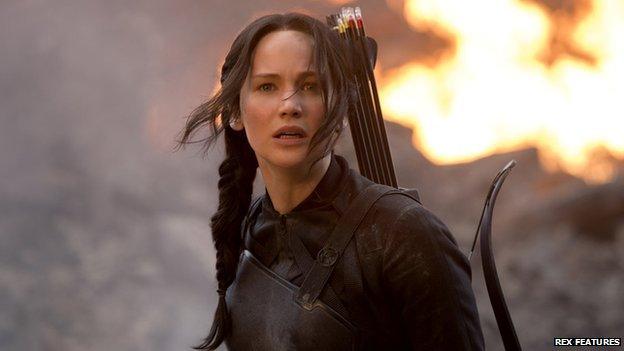
Next to each kneeling, hooded captive stands an emotionless soldier with their finger on the trigger of their gun. On a hidden command they fire, and the line of bodies falls to the floor.
This scene, which has become depressingly familiar in recent months, is not another grisly video released by the Islamic State militant group. It's from the biggest film of the year so far, The Hunger Games: Mockingjay - Part 1.
Eerily, it was shot nearly a year before the first IS beheading video was released.
The third instalment of the series made £12.6m in the UK and $123m (£78m) in the US in its opening weekend.
While the movie version of The Hunger Games, based on the young adult series by Suzanne Collins, is packed with big name stars like Jennifer Lawrence, Woody Harrelson and Donald Sutherland, some are more interested in the politics of the film and how it seems to parallel reality.
Another scene shows an emaciated and brainwashed Peeta Mellark, played by Josh Hutcherson, flatly repeating lines fed to him by his captors. In the movie the tyrannical President Snow imprisons Peeta and turns him into a propaganda tool in order to quell an uprising.
On the other side, Ms Lawrence's Katniss Everdeen is also being used as a tool, but for the rebel army. For many this "war of the airwaves" served as an interesting look at the state of modern warfare.
"I think there are parallels with ISIS," director Francis Lawrence said in an interview, external with the Daily Best. "We made this film before the videos were released, so it's a chilling reminder of what can happen in the real world."
Mr Lawrence said one of the themes he explored was the manipulation of imagery and people in propaganda. The practice has been around for a long time, he said, but technology has made it easier to deliver and much more immediate.
The jihadist IS wasn't the only real-world similarity in the film. At one point a covert volunteer team sets out to rescue Peeta from the US Capitol in the middle of the night. Watching the small group fly a helicopter and burst into a secure compound, it's difficult not to see parallels with the US raid on Osama bin Laden.
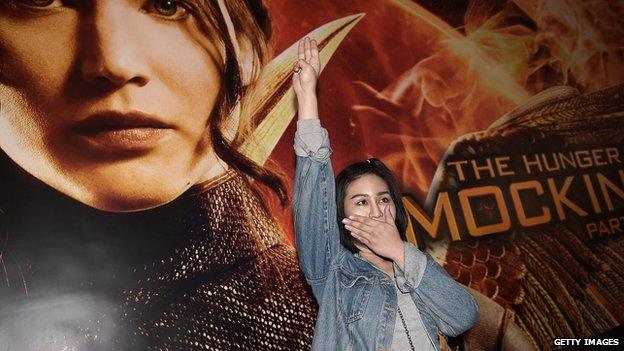
The Hunger Games-inspired three-finger salute has become a symbol of protest in Thailand
One shot even shows the leaders of the rebellion sitting in a room watching camera footage of the mission - an image that strongly resembles the iconic photo, external of President Barack Obama, Secretary of State Hillary Clinton and Vice-President Joe Biden viewing footage of the Seal commando team.
The Guardian's Suzanne Moore says this children's movie, external was far from childish, but instead was "violent and despairing".
"These are the kinds of images our children see, whether we want them to or no," Moore writes. "When Katniss stands in the rubble of her district razed to the ground, it could be parts of Syria, Gaza, Iraq, Afghanistan."
She says the fact that Mockingjay is so popular is a grim reflection on the teenagers of today, who grew up on increasingly graphic imagery.
Rebecca Cusey, writing for the Federalist, external, contends that the film is dark, but the complex way it explores the idea of propaganda makes sense compared to the books, which were written in the mid-2000s.
"The world seems darker," she writes. "We can no longer attribute these problems to pro-war propaganda. Increasingly, we know evil exists and is not going away. Maybe we need symbols to inspire us."
But the Telegraph's Tim Stanley argues, external that people may just be reading too much into the work. Sometimes a cigar is just a cigar, as Sigmund Freud quipped.
He says the film's ideology does not belong just to liberals who see the story as inspiration to organise against the conservatives.
But neither does it belong solely to conservatives who have latched on to the propaganda narrative, he continues, and linked it to the Obama administration's supposed manipulation of the press. Some have even found a survivalist theme in the film, he writes - a call for people to grab their guns and run before Mr Obama comes for them.
"In reality, The Hunger Games is first and foremost a fine piece of rollicking fiction," he writes. "The right and left's attempts to read the books and movies to suit their agendas proves the point of postmodern thinkers who argue that readers/viewers interpret art according to their own ends - and we should be highly sceptical of their efforts."
Images from the film have spilled over into real life, however. One symbol - a three-fingered salute - cropped up in Thailand, where five students were arrested last week for flashing the gesture. The salute took hold in May after the country's military coup. Since then, Gen Prayuth Chan-ocha, the leader of the junta, has made the gesture illegal.
One cinema chain in Thailand recently pulled their screenings of Mockingjay, saying that they wanted to avoid getting involved in a political movement.
While The Hunger Games may borrow from reality, it seems reality may start borrowing in return.
(By Kierran Petersen)
- Published24 November 2014
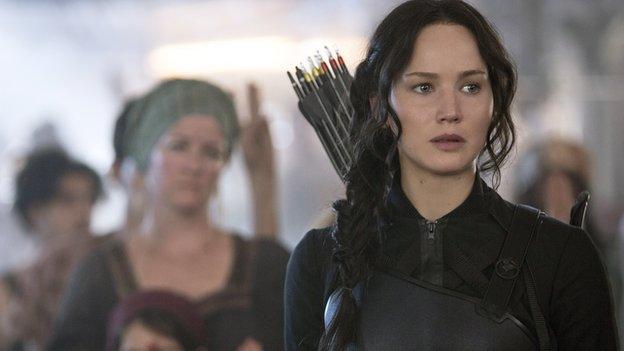
- Published19 November 2014
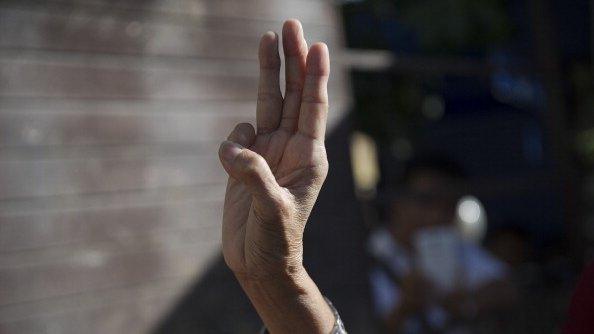
- Published11 July 2012
